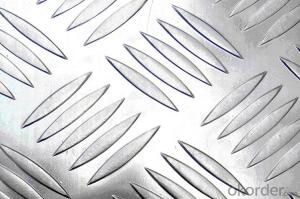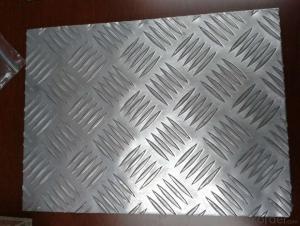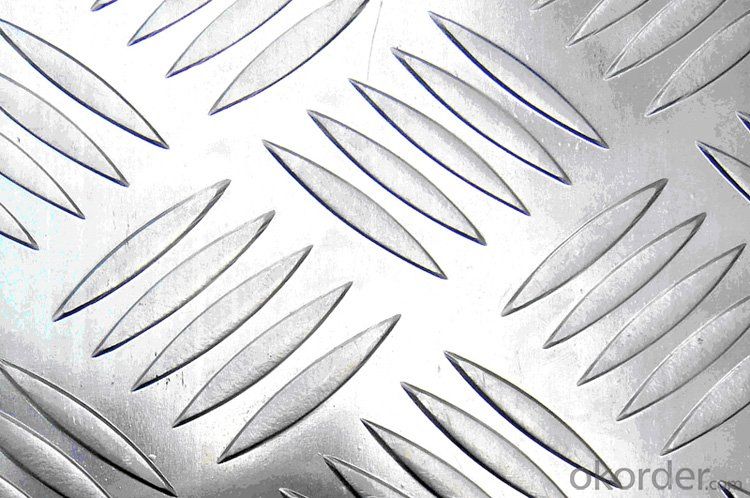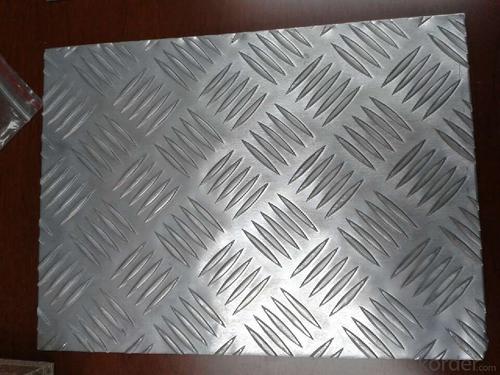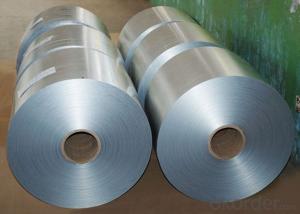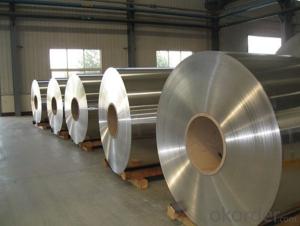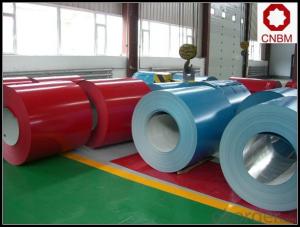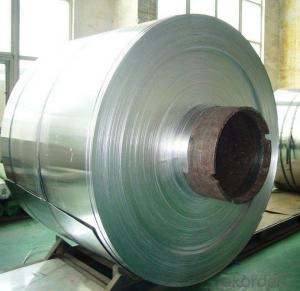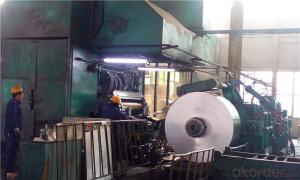Custom Color Coated Aluminum Coil - Aluminum Trade Plate 3003 H14
- Loading Port:
- China Main Port
- Payment Terms:
- TT OR LC
- Min Order Qty:
- -
- Supply Capability:
- -
OKorder Service Pledge
OKorder Financial Service
You Might Also Like
Aluminium alloys (or aluminum alloys;see spellingdifferences) are alloys in which aluminium(Al) is the predominant metal. The typical alloying elements are copper, magnesium,manganese,silicon,tin and zinc. There are twoprincipal classifications, namely casting alloys and wrought alloys, both of which are furthersubdivided into the categories heat-treatableand non-heat treatable. About 85% of aluminium is used for wrought products,for example rolled plate, foils and extrusions.Cast aluminium alloys yield cost-effective products due to the low meltingpoint, although they generally have lower tensilestrengths than wrought alloys. The most important cast aluminiumalloy system is Al–Si, where the high levels of silicon (4.0–13%)contribute to give good casting characteristics. Aluminium alloys are widelyused in engineering structures and components where light weight or corrosionresistance is required
Finishing: Mill Finish, Painted,One Side Bright, Brushed and Coil Anodizing available on request
Alloy: AA1050,1060, 1100, AA3003, 3005, 3015, 5052, 5754, 5083,8011, etc
Temper: H14/16/18/22/24/32,HO etc.
Thickness:0.2mm—100mm
Width:100mm—2300mm (Can be slitted)
Standard: GB/T 3880-2006 ASTM B-209
- Q: Are aluminum coils resistant to abrasion?
- Yes, aluminum coils are generally resistant to abrasion.
- Q: What is the process of manufacturing aluminum coils?
- The process of manufacturing aluminum coils involves several steps. First, raw materials such as aluminum ingots or scrap are melted in a furnace at high temperatures. This molten aluminum is then transferred to a continuous casting machine, where it is solidified into a long, thin slab called a billet. The billet is then heated and passed through a series of rolling mills to reduce its thickness and shape it into a coil. This process, known as hot rolling, involves several passes through the rolling mills, with each pass gradually reducing the thickness of the aluminum. After hot rolling, the coil may undergo various additional processes depending on the desired final product. For instance, it may go through a process called cold rolling, which further reduces the thickness and improves the surface finish of the aluminum. Cold rolling also imparts certain mechanical properties to the metal, such as increased strength and hardness. Next, the coil may be subjected to various surface treatments, such as cleaning, etching, or coating, to enhance its appearance and protect it from corrosion. These treatments may involve chemical processes or application of protective coatings. Finally, the aluminum coil is typically cut into smaller lengths, known as sheets or strips, and packaged for shipment to customers. These sheets or strips may undergo further processing, such as fabrication or forming, to meet specific customer requirements. Overall, the process of manufacturing aluminum coils involves melting and casting the aluminum, hot and cold rolling to shape and refine it, surface treatments for protection and appearance, and cutting and packaging for distribution.
- Q: Can aluminum coils be used for heat recovery systems?
- Yes, aluminum coils can be used for heat recovery systems. Aluminum is a highly conductive material, which makes it an excellent choice for transferring heat. Aluminum coils are often used in heat exchangers and heat recovery systems to efficiently transfer heat from one medium to another. These coils are designed to maximize surface area, allowing for greater heat transfer. Additionally, aluminum is lightweight and corrosion-resistant, making it durable and suitable for various applications in heat recovery systems.
- Q: I have a couple aluminum baking sheets, and when i wash them, then dry them with a towel, it turns the towel black? why is this? are these still ok to use? Ive been putting one of those silicone baking sheets or parchment paper on the sheets because of this. but i cant really do that with the cake pan. so how do i stop it from doing this?
- I means that they are very inexpensive. Aluminum does this when it 's been in soapy water. Use the baking sheets just to be safe until you can get some others of a higher quality.
- Q: Are aluminum coils suitable for reflective insulation?
- Yes, aluminum coils are suitable for reflective insulation. Aluminum is a highly reflective material that can effectively reflect heat and light, making it an excellent choice for insulation applications that require thermal control and energy efficiency.
- Q: Is it safe for individuals to handle aluminum coils?
- <p>Aluminum coils are generally safe to handle under normal conditions. They do not emit harmful radiation or toxic fumes. However, it's important to take precautions to avoid injury from sharp edges or heavy weight. Always use appropriate lifting equipment or assistance when handling heavy coils. Additionally, wear protective gloves to prevent cuts and ensure good housekeeping to avoid tripping hazards. In case of skin contact with certain aluminum processing fluids, it's advisable to wash the affected area immediately with soap and water.</p>
- Q: Are aluminum coils suitable for heat exchangers?
- Aluminum coils are indeed a fitting choice for heat exchangers. This is because aluminum possesses exceptional thermal conductivity, making it highly efficient and effective in transferring heat between mediums. Its ability to swiftly transfer heat from one medium to another is particularly advantageous for heat exchangers that require efficient heat transfer. Furthermore, aluminum coils are lightweight, resistant to corrosion, and boast excellent durability. These qualities contribute to their popularity in a wide range of applications, including heat exchangers. The corrosion resistance of aluminum ensures that the coils can endure harsh environments and prevent the occurrence of rust or corrosion, thereby prolonging the heat exchanger's lifespan. Moreover, aluminum coils are easily moldable and can be shaped into various forms, allowing for flexibility in designing and constructing heat exchangers. This adaptability makes them suitable for a diverse array of applications, such as HVAC systems, refrigeration units, and automotive cooling systems. In conclusion, the high thermal conductivity, lightweight nature, corrosion resistance, durability, and versatility of aluminum coils make them well-suited for heat exchangers. These properties establish aluminum coils as an excellent choice for achieving efficient heat transfer in numerous industries.
- Q: Is it safe to use aluminum coils in various applications?
- <p>Yes, aluminum coils are generally safe to use. They are widely used in various industries due to their excellent thermal conductivity, corrosion resistance, and lightweight properties. Aluminum coils are non-toxic and do not emit harmful substances, making them safe for applications such as food packaging and construction. However, safety can depend on specific uses and manufacturing processes, so it's important to ensure that the coils meet the required safety standards for their intended application.</p>
- Q: Can aluminum coils be used in the production of aluminum windows?
- Yes, aluminum coils can be used in the production of aluminum windows. Aluminum coils are often used as a raw material in the manufacturing process of aluminum windows. These coils are typically made from high-quality aluminum and are rolled into thin, flat sheets. These sheets can then be cut and shaped into the desired frame size and design for the windows. Aluminum is a popular material for window frames due to its durability, lightweight nature, and resistance to corrosion. The use of aluminum coils in the production of aluminum windows allows for efficient and cost-effective manufacturing processes while also providing a high-quality end product.
- Q: Are aluminum coils suitable for outdoor applications?
- Yes, aluminum coils are suitable for outdoor applications. Aluminum is known for its excellent corrosion resistance, making it a popular choice for outdoor use. It is not prone to rust or deterioration when exposed to moisture, sunlight, or harsh weather conditions. Additionally, aluminum coils are lightweight, durable, and have a high strength-to-weight ratio, making them ideal for various outdoor applications such as roofing, gutters, air conditioning systems, and outdoor furniture. Moreover, aluminum is a highly recyclable material, making it an environmentally-friendly choice for outdoor projects. Overall, aluminum coils are a reliable and practical option for outdoor applications.
Send your message to us
Custom Color Coated Aluminum Coil - Aluminum Trade Plate 3003 H14
- Loading Port:
- China Main Port
- Payment Terms:
- TT OR LC
- Min Order Qty:
- -
- Supply Capability:
- -
OKorder Service Pledge
OKorder Financial Service
Similar products
Hot products
Hot Searches
Related keywords
